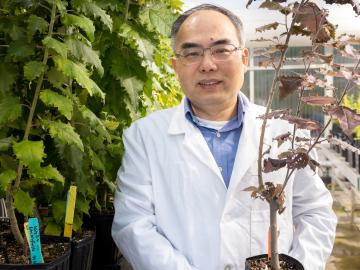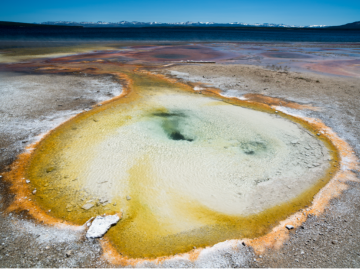
Filter News
Area of Research
- Advanced Manufacturing (3)
- Biological Systems (1)
- Biology and Environment (49)
- Building Technologies (1)
- Computational Biology (1)
- Computer Science (2)
- Electricity and Smart Grid (1)
- Energy Science (56)
- Fuel Cycle Science and Technology (1)
- Functional Materials for Energy (1)
- Fusion and Fission (19)
- Fusion Energy (1)
- Isotopes (3)
- Materials (42)
- Materials for Computing (2)
- National Security (20)
- Neutron Science (12)
- Nuclear Science and Technology (7)
- Supercomputing (32)
News Topics
- (-) 3-D Printing/Advanced Manufacturing (38)
- (-) Artificial Intelligence (41)
- (-) Big Data (20)
- (-) Bioenergy (44)
- (-) Biomedical (18)
- (-) ITER (2)
- (-) Mercury (6)
- (-) Microscopy (25)
- (-) Nuclear Energy (41)
- (-) Transportation (35)
- Advanced Reactors (8)
- Biology (58)
- Biotechnology (9)
- Buildings (30)
- Chemical Sciences (39)
- Clean Water (11)
- Composites (12)
- Computer Science (59)
- Coronavirus (13)
- Critical Materials (14)
- Cybersecurity (19)
- Education (3)
- Element Discovery (1)
- Emergency (1)
- Energy Storage (48)
- Environment (85)
- Exascale Computing (24)
- Fossil Energy (3)
- Frontier (29)
- Fusion (20)
- Grid (32)
- High-Performance Computing (49)
- Hydropower (11)
- Irradiation (3)
- Isotopes (21)
- Machine Learning (25)
- Materials (96)
- Materials Science (42)
- Mathematics (2)
- Microelectronics (2)
- Molten Salt (5)
- Nanotechnology (25)
- National Security (38)
- Neutron Science (54)
- Partnerships (32)
- Physics (33)
- Polymers (14)
- Quantum Computing (19)
- Quantum Science (21)
- Security (14)
- Simulation (35)
- Software (1)
- Space Exploration (10)
- Summit (18)
Media Contacts

The Department of Energy’s Oak Ridge National Laboratory announced the establishment of the Center for AI Security Research, or CAISER, to address threats already present as governments and industries around the world adopt artificial intelligence and take advantage of the benefits it promises in data processing, operational efficiencies and decision-making.

For 25 years, scientists at Oak Ridge National Laboratory have used their broad expertise in human health risk assessment, ecology, radiation protection, toxicology and information management to develop widely used tools and data for the U.S. Environmental Protection Agency as part of the agency’s Superfund program.

Scientist Xiaohan Yang’s research at the Department of Energy’s Oak Ridge National Laboratory focuses on transforming plants to make them better sources of renewable energy and carbon storage.

ORNL hosted its annual Smoky Mountains Computational Sciences and Engineering Conference in person for the first time since the COVID-19 pandemic.

Oak Ridge National Laboratory researchers have conducted a comprehensive life cycle, cost and carbon emissions analysis on 3D-printed molds for precast concrete and determined the method is economically beneficial compared to conventional wood molds.

The Department of Energy’s Oak Ridge National Laboratory hosted its Smoky Mountains Computational Science and Engineering Conference for the first time in person since the COVID pandemic broke in 2020. The conference, which celebrated its 20th consecutive year, took place at the Crowne Plaza Hotel in downtown Knoxville, Tenn., in late August.

In June, ORNL hit a milestone not seen in more than three decades: producing a production-quality amount of plutonium-238

Oak Ridge National Laboratory scientists studied hot springs on different continents and found similarities in how some microbes adapted despite their geographic diversity.

The Exascale Small Modular Reactor effort, or ExaSMR, is a software stack developed over seven years under the Department of Energy’s Exascale Computing Project to produce the highest-resolution simulations of nuclear reactor systems to date. Now, ExaSMR has been nominated for a 2023 Gordon Bell Prize by the Association for Computing Machinery and is one of six finalists for the annual award, which honors outstanding achievements in high-performance computing from a variety of scientific domains.

Speakers, scientific workshops, speed networking, a student poster showcase and more energized the Annual User Meeting of the Department of Energy’s Center for Nanophase Materials Sciences, or CNMS, Aug. 7-10, near Market Square in downtown Knoxville, Tennessee.


